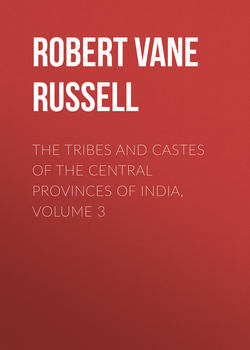Читать книгу The Tribes and Castes of the Central Provinces of India, Volume 3 - Robert Vane Russell - Страница 86
Gond
(g) Appearance and Character, and Social Rules and Customs
68. Food
ОглавлениеThe Gonds have scarcely any restriction on diet. They will eat fowls, beef, pork, crocodiles, certain kinds of snakes, lizards, tortoises, rats, cats, red ants, jackals and in some places monkeys. Khatola and Rāj-Gonds usually abstain from beef and the flesh of the buffalo and monkey. They consider field-mice and rats a great delicacy, and will take much trouble in finding and digging out their holes. The Māria Gonds are very fond of red ants, and in Bastar give them fried or roasted to a woman during her confinement. The common food of the labouring Gond is a gruel of rice or small millet boiled in water, the quantity of water increasing in proportion to their poverty. This is about the cheapest kind of food on which a man can live, and the quantity of grain taken in the form of this gruel or pej which will suffice for a Gond’s subsistence is astonishingly small. They grow the small grass-millets kodon and kutki for their subsistence, selling the more valuable crops for rent and expenses. The flowers of the mahua tree are also a staple article of diet, being largely eaten as well as made into liquor, and the Gond knows of many other roots and fruits of the forest. He likes to eat or drink his pej several times a day, and in Seoni, it is said, will not go more than three hours without a meal.
Gonds are rather strict in the matter of taking food from others, and in some localities refuse to accept it even from Brāhmans. Elsewhere they will take it from most Hindu castes. In Hoshangābād the men may take food from the higher Hindu castes, but not the women. This, they say, is because the woman is a wooden vessel, and if a wooden vessel is once put on the fire it is irretrievably burnt. A woman similarly is the weaker vessel and will sustain injury from any contamination. The Rāj-Gond copies Hindu ways and outdoes the Hindu in the elaboration of ceremonial purity, even having the fuel with which his Brāhman cook prepares his food sprinkled with water to purify it before it is burnt. Mr. A. K. Smith states that a Gond will not eat an antelope if a Chamār has touched it, even unskinned, and in some places they are so strict that a wife may not eat her husband’s leavings of food. The Gonds will not eat the leavings of any Hindu caste, probably on account of a traditional hostility arising out of their subjection by the Hindus. Very few Hindu castes will take water or food from the Gonds, but some who employ them as farmservants do this for convenience. The Gonds are not regarded as impure, even though from a Hindu point of view some of their habits are more objectionable than those of the impure castes. This is because the Gonds have never been completely reduced to subjection, nor converted into the village drudges, who are consigned to the most degraded occupations. Large numbers of them hold land as tenants and estates as zamīndārs; and the greater part of the Province was once governed by Gond kings. The Hindus say that they could not consider a tribe as impure to which their kings once belonged. Brāhmans will take water from Rāj-Gonds and Khatola Gonds in many localities. This is when it is freshly brought from the well and not after it has been put in their houses.
